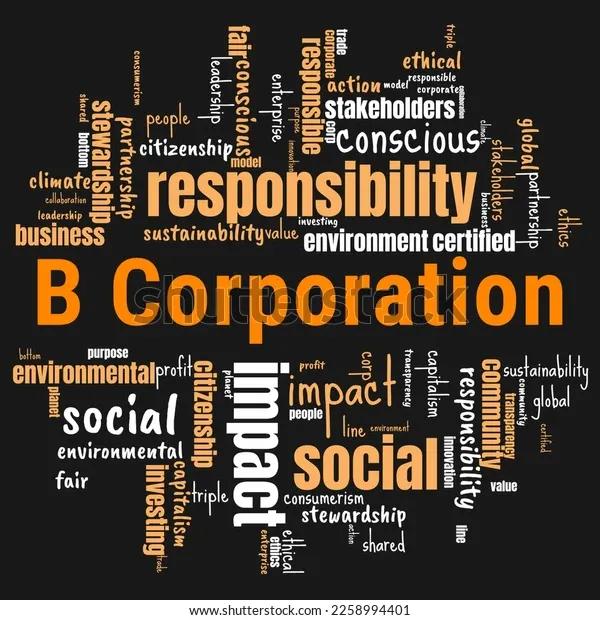The model of Triple Impact is how companies start to work: not only is it a matter of having financial remits, but rather of having these rights, but thinking about environmental care and social impact. In this article, the general aspects of the Model and the organizations that nuclean and certify the companies that want to be “Best for the World”.
What is a Triple Impact model?
These are economic formats that pursue other distinct ends than just making money. Within this format or model, companies give an important place to action-oriented decisions and work programmes:
- Mitigan the environmental damage produced by its own processes and therefore help to combat climate change
- They focus on the social look where these companies are located or have operations contributing, for example, to the development of local producers by improving their work practices, placing their products on the market and environmental care.
- Dan transparency in your corporate government management model
- They play social equality.
The triple impact is a movement, a path of evolution that every day sums up more companies who strongly think that environmental, social equality and economic equity problems cannot be solved alone, but that should work with governments and non-governmental organizations with the necessary experience in this field.
With this idea, it was born in the United States in 2006, B. Lab with the idea that “a different type of economy was not only possible, but necessary, and that companies could lead the way to a new model driven by stakeholders. B Lab became known to certify B Companies, which are companies that meet high standards of social and environmental performance, responsibility and transparency” [1].
For your part System B is the civil organization representing the B. Lab in Latin America. Since its creation in April 2012 they support companies seeking to be better for the planet and want to be part of the World B.
What is the sense of being Company B?
The fundamental concept of this movement is to redefine the sense of the success of the economy, supporting the construction of a favourable ecosystem to strengthen the companies and actors of the economy using the market force to solve social and environmental problems.
Where do you focus the changes to be Company B?
The Way to Certifie as Company B implies working on five areas of interest:
- Governance
- Workers
- Customers
- Community
- Environment
To get to know the level of compliance in each area of interest, a questionnaire of assessment is used which uses each of them and, according to the response given, a score is assigned.
It may occur that by giving a given response the questionnaire enables other additional questions that support the initial response, thus extending the questionnaire.
For certification 80 points or more must be obtained. The evaluation is available for free in https://www.systemb.org/ser-b/
Although access to the questionnaire is free of charge, it is highly recommended to have professional advice on how to develop and complete the questions related to each area of interest, so that it fits the size and object of your company.
Here are some examples of the topics covered by the questionnaire in each area of interest:
Governance:
- Impact commitment level: describe your company's approach to generate a positive impact.
- How does your company integrate social and environmental performance in decision making?
- How does the company identify, measure and manage the most significant social and environmental problems related to its operations and business model?
- The existence of a Code of Ethics and the empowerment given to workers on the same.
- Anti-corruption practices.
Workers:
- If the company subcontracts the services of other companies or people.
- Salaries: remuneration practices and policies, initiatives to increase wages and benefits.
- Appropriation of employees divided into full time and part time
- Reform programs.
- Health, well-being and occupational safety benefits.
- Employee evaluation processes, internal promotion, hiring passers.
- Training in general: for work in itself, labor rights, diversity.
Community:
- If your business model generates a specific benefit for stakeholders such as associated charity organizations, disadvantaged suppliers or local community.
- Inclusive hiring practices.
- Management of diversity, equity and inclusion.
- Purchases to local suppliers or in the country where it operates and associated policy to purchase to local suppliers.
- Practices that implement the company for the execution of beneficial donations.
- Suppliers who applied the company's Code of Conduct and Ethics.
- Processes that check the preference to buy materials or products that have a social or environmental certification or approval.
Environment:
- If the company's productive processes contemplate remediation with an environmental impact produced by it.
- Environmental efficiency of the facility.
- The existence and application of an Environmental Management System.
- If the products manufactured in the company consider the environmental impacts that can be generated by the company's own manufacturing process.
- Evaluation of the environmental footprint applied to the value chain, supply chain.
- Product/s submitted to an assessment of the environmental footprint.
- Consumption of energy, water and the existence of programmes for reduction.
- Waste management in all its currents, recycling programmes.
- Measurement of Invernate Effect Gases (GEI) in its three ranges: 1, 2 and 3.
Customers:
- Practices that implement your company to manage the impact and value created for customers.
- Programs to monitor the impacts of your products on customer welfare.
- The existence of formal programs in progress to continuously improve the results obtained by customers (e.g. reduce the negative effects or increase the positive effects)
Can any company be a B company?
There are some requirements that companies must meet to access the process and make sure as Company B:
Take over 12 months of operations
Companies that have less of this operating time will have access to the B Brinco seal.
Operating in a competitive market
The company must operate in a competitive market and be exposed to the normal risks of being a company, competitors, taxes, market changes. Companies operating in a monopoly are government-controlled or have substantial benefits related to tax payment for example will not be eligible for Certification B.
Company B Legal Request
The company must be able, and willing to comply with Company B's legal requirement and to carry out it effectively when it conforms to its certification process.
Entity for profit
The philosophy of companies B is to prove that companies can take on the resolution of socio-environmental problems through their business. Thus, non-profit entities such as foundations, NGOs, among other civil entities, may not access Company B certification, since they were created specifically to solve these problems.
Complete Business and Distinct
Company B Certification is for complete business, including all areas of management of this company. You cannot access individual certification for your divisions, brands, departments or companies that do not have control of your product or service.
Certification as Enterprise B step by step:
- To complete the B Impact Assessment: to be Company B, the B Impact Assessment (B or EIB Evaluation) must be completed. It is a free tool, the information delivered is confidential and is designed to help measure and manage the company's positive impact on its employees, the community, consumers and the environment.
- Disclosure Questionnaire and Controversial Industries: In addition to completing Impact Assessment B, the company must declare the company's relationship with controversial or negative industries or practices.
- Sending Impact Assessment B for review: Once the B Impact Assessment has been completed, the company must obtain a score of at least 80 points to be able to submit its review and formally start the certification process.
- Initial eligibility: in this step System B International will confirm that the company meets the basic requirements to opt for B Company Certification and additional requirements, depending on the characteristics of the Company.
- Initial payment: completed this first stage called Initial Eligibility, the company must make the initial payment in order to be able to formally start the certification process. This non-refundable initial payment corresponds to 30% of the annual certification fee, evaluated according to the company's annual billing.
- Evaluation and Verification: in the evaluation phase will be reviewed in detail key elements of the Impact Assessment B completed: industry, dimension and areas with higher score. If the score is maintained by 80 points, the company can proceed to the verification process.
To start the verification stage, documents and evidence are required to test the practices, policies and processes reported. If after verification, the company still remains with 80 points, it will be eligible to be Company B Certified paying the annual fee and signing the B Company Agreement.
Based on the company's characteristics, there is the possibility of a face-to-face audit by the B Lab team.[2]
- Payments: make payments defined by System B.
How many companies Is there B in the world?
Currently there are 5537 Companies B certified in the world and 898 in Latin America (of which 170 are in Argentina). In addition, more and more companies looking to become to generate a collective good and acquire the certification of Company B.
For more information about B Lab and System B:
- https://www. bcorporation.net/en-us/
- https://www.systemb.org/?gclid=Cj0KCQiAz9ieBhCIARIsACB0oGJPHYDaRRYIcBkqbNT9sK91JIjrh3Baf6wR9TgZwyHnvtiUnt7AsFkaAgphEALw_wcB
About the author of the note:
Julio S. Larrouy is an Engineer in Environmental Safety and Graduated in Hygiene and Safety at Work with more than 34 years of experience as Responsible for Safety, Hygiene and Environment in different construction projects (civil works, electromechanicals, gas pipelines, oil plants and water treatment plants), in water treatment plants in operation and mass consumption companies. These activities were carried out both nationally and internationally.
Contact: jlarrouy@hotmail. with
[1] bcorporation. net / ABOUT B LAB[2] Material obtained from https://www.systemb.org/ser-b/



Comments